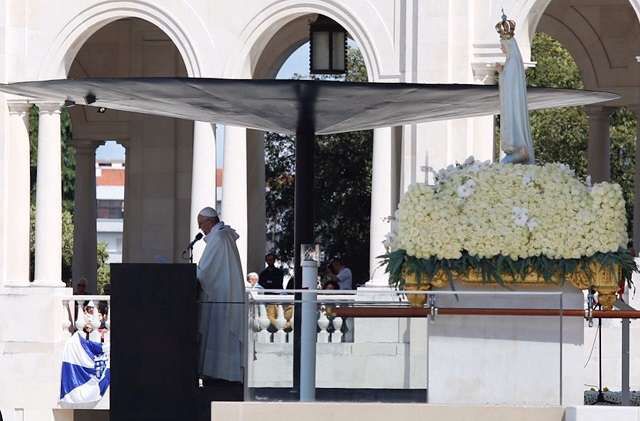Fatima, Portugal, May 13, 2017 / 05:23 am (CNA/EWTN News).- On Saturday, Pope Francis told those gathered at Fatima, in particular the sick and suffering, to follow the example of the newly canonized saints Francisco and Jacinta, offering their lives — both the joy and suffering — as a gift for God.
“Today the Virgin Mary asks all of us the same question that, a hundred years ago, she asked the shepherd children: ‘Do you want to offer yourselves to God?’ Their answer — ‘Yes, we do!’ — makes us able to understand and imitate their lives.” “They lived life, with its share of joy and suffering, as an offering to the Lord. I invite those of you who are sick to live your lives as a gift. Like the shepherd children, tell Our Lady that you want to offer yourselves to God with all your heart,” Pope Francis said May 13.
The Pope’s words were said during a special greeting to the sick during Eucharistic adoration immediately following the canonization Mass of Saints Francisco and Jacinta Marto at the Sanctuary of Our Lady of Fatima in Portugal. Francis presided over the Mass with around 500,000 pilgrims during his two-day pilgrimage May 12-13 for the 100th anniversary of her appearance to the two shepherd children along with their cousin, Lucia.
Speaking to all of the sick and suffering present, he said they should not think of themselves just as recipients of charitable solidarity, but know that they are full participants in the Church’s life and mission. “Your silent presence, which is more eloquent than a flood of words, your prayers, the daily offering of your sufferings in union with those of Jesus crucified for the salvation of the world, the patient and even joyful acceptance of your condition — all these are a spiritual resource, an asset to every Christian community,” he said.
“Do not be ashamed of being a precious treasure of the Church.” Entrust your sorrows, sufferings and weariness to Jesus, he went on, who is hidden but still present in the Eucharist, just as he is also hidden in the wounds of the sick and suffering. “On the altar, we worship the flesh of Jesus; in these our brothers and sisters, we encounter the wounds of Jesus.”
“Jesus will pass close to you in the Blessed Sacrament as a sign of his closeness and love for you,” he continued. “Count on the prayers of the Church, which from every corner of the world rises up to heaven for you and with you. God is our Father, and he will never forget you.”
Jesus knows the meaning of sorrow and pain, he said, because in his passion and death, Christ took all of our suffering upon himself. He will comfort us and give us strength, just like he did for St. Francisco and St. Jacinta and for every saint, he said. “That is the Church’s ministry: the Church asks the Lord to comfort the afflicted like yourselves, and he comforts you, even in ways you cannot see.”
Before giving his message to the sick, the Pope said in his homily for the canonization Mass that we don’t climb the cross to find Jesus, Jesus comes down to us “to dispel the darkness of evil within us, and to bring us back to the light.” In Lucia’s account of the apparitions, he noted, the three children found themselves “surrounded by God’s light as it radiated from Our Lady. She enveloped them in the mantle of Light that God had given her.”
“According to the belief and experience of many pilgrims, if not of all,” he continued, “Fatima is more than anything this mantle of Light that protects us, here as in almost no other place on earth.” All we need to do, he explained, is to “take refuge” in the protection of the Virgin Mary, asking her, as it says in the Salve Regina prayer, to ‘show unto us…Jesus.’”
The Pope thanked everyone for being with him in Fatima, saying that he “could not fail” to come and venerate the Blessed Virgin Mary and entrust them all to her. Under her mantle, we are not lost, he said, and “from her embrace will come the hope and the peace” that we require. “Confirmed in this hope, we have gathered here to give thanks for the countless graces bestowed over these past hundred years,” he said.
Newly canonized, we take St. Francisco and St. Jacinta as our examples. They were taught by Mary to adore Jesus and this became their strength in suffering. “God’s presence became constant in their lives, as is evident from their insistent prayers for sinners and their desire to remain ever near ‘the hidden Jesus’ in the tabernacle.”
Therefore, “with Mary’s protection,” he concluded, “may we be for our world sentinels of the dawn, contemplating the true face of Jesus the Savior, resplendent at Easter.” “Thus may we rediscover the young and beautiful face of the Church, which shines forth when she is missionary, welcoming, free, faithful, poor in means and rich in love.”

